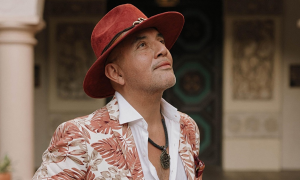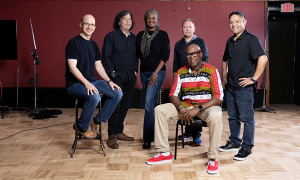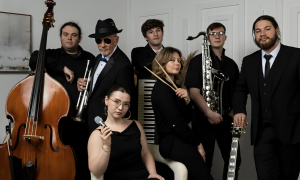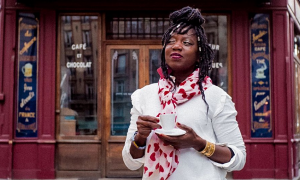Home » Jazz Articles » Take Five With... » Take Five with Will Lyle
Take Five with Will Lyle

Meet Will Lyle
Born in Southern California, Will began studying cello when he was three and also played drums, guitar, piano and percussion, taking up the electric bass at the age of 12. "I had aspirations to become a producer and I originally went to Berklee for musical production, but during my freshman year I heard
Paul Chambers
bass, acoustic1935 - 1969

Billy Kilson
drumsb.1962
L.A. Source Codes, his recording debut as a leader, teams the bassist with three generations of musicians. Two great veterans, pianist

Jon Mayer
pianob.1938

Roy McCurdy
drumsb.1936

Bob Sheppard
saxophone, tenorb.1952

Mahesh Balasooriya
piano
Marvin "Smitty" Smith
drumsb.1961

Grant Green
guitar1935 - 1979
Instruments:
My two main instruments are upright and electric bass. I also play guitar, piano, and basic drums. I enjoy singing and working on my vocal ability.Teachers and/or influences?
First and foremost, my biggest teachers and influence in my life are my father, Bruce Lyle, and my mother, Corinne Nevinny. Both supported my ambitions and were fantastic role models from day one.My first music teachers were Carol Rice (cello) and Vivian Chen (piano). My most influential teachers in my formative years were Gabe Rosales and Darren Wilsey, Gabe is unbelievable electric bassist who taught me about RnB, funk, basic jazz music, and various music from around the world. Darren is a classically trained guitarist who went to my alma mater (Manhattan School of Music) and these days is mainly a composer, producer, and arranger. When I went to college, I encountered my mentor in jazz music,

Ralph Peterson
drums1962 - 2021

Neal Smith
drumsWhen I got to LA, I studied with

John Clayton
bassb.1952

Ron Carter
bassb.1937
All of my teachers, such as Ralph, Neal, Maestro, and the rest are huge influences. My biggest bass influences would have to be Paul Chambers,

Ray Brown
bass, acoustic1926 - 2002

Milt Hinton
bass, acoustic1910 - 2000

Oscar Pettiford
bass1922 - 1960

Leroy Vinnegar
bass, acoustic1928 - 1999

Sam Jones
bass, acoustic1924 - 1981

Rufus Reid
bass, acousticb.1944

Ray Drummond
bassb.1946

Jymie Merritt
bass1926 - 2020

Buster Williams
bass, acousticb.1942

Charlie Haden
bass, acoustic1937 - 2014

Dave Holland
bassb.1946

Drew Gress
bassb.1959

Dwayne Burno
bass1970 - 2013

Peter Washington
bassb.1964

Christian McBride
bassb.1972
Bob Hurst
bass
Tony Dumas
bassb.1955

Neil Swainson
bass, acousticb.1955
Non-bassists include Kenny Barron, James Williams, Kenny Kirkland, Woody Shaw, Freddie Hubbard, Mulgrew Miller, Cedar Walton, Kenny Dorham, of course Bird and Diz, Miles, Coltrane, Oscar Peterson, Fred Hersch, Art Blakey, Elvin Jones, Dexter Gordon, James Moody, Wes Montgomery, Milt Jackson, Bobby Hutcherson, Lee Morgan, Gene Harris, Wayne Shorter, Tony Williams, Jack DeJohnette, Geri Allen, Herbie Hancock, Joe Henderson, Lucky Thompson, Osie Johnson, Bill Evans, Ed Thigpen, Sonny Payne, Tommy Flanagan, Phineas Newborn, Greg Hutchinson, Hank Jones, Frank Sinatra, Count Basie, Louis Hayes, Jeff "Tain" Watts, Shirley Horn, Clifford Brown, Ben Riley, Nat Adderley, Cannonball Adderley, Betty Carter, Sarah Vaughan, and Jackie McLean.
There are of course countless non-jazz influences I could name, but we'd be here for a long time!
I knew I wanted to be a musician when...
Tackling the Monster featuring
Wynton Marsalis
trumpetb.1961
Your sound and approach to music.
I love this question! I've heard from many sources that jazz musicians must have one foot in the past and one foot in the present (or future, depending on who you talk to!) I also believe jazz (and any good music) unites the beautiful and the ugly parts of ourselves, the human and divine, elegant and profane, and so on. I think good music inspires feeling as well as thought from the listener. We must entertain as well as challenge and question. But most of all, we have to enjoy what we do and do it with conviction.I consider my sound to be an amalgamation either consciously or subconsciously of people I like to listen to.
Your teaching approach
I'm a huge believer in teaching the student themselves, not simply the material. Each person must be dealt with on a case-by-case basis. Usually I find students to have individual strengths and weaknesses. It is my job to give them work which strengthens that which they are comfortable with, as well as work which highlights their shortcomings. I always learn from my students. My teacher Ralph had a no-nonsense approach of honesty, objectivity, and dedication to jazz which I felt was enormously effective.Your dream band
My dream band could probably be filled around 10 or 20 or 50 times over of people who have passed away. I think I really would have loved to play with
James Williams
piano1951 - 2004

Harold Mabern
piano1936 - 2019
Today, who would my dream band be? It's tough to say because sometimes people are different when you play with them as opposed to hearing them on a record. You can also compile a star-studded group of the most "killing" players, but that still won't necessarily make the best band. Certain bands are what they are because of their B and C list personnel, in my opinion. I definitely got some of my dream band on this record.
I'll leave out anyone I've previously worked with for this answer. Maybe if we're being hypercritical, for piano I'd choose Geoff Keezer,

Mike LeDonne
organ, Hammond B3b.1956

David Kikoski
pianob.1961

Jeremy Pelt
trumpetb.1976
Road story: Your best or worst experience
My best experience would probably be Billy Kilson's tour to Japan in 2017. I met so many amazing people and played for wonderful audiences. It's also where I met my girlfriend, an amazing woman, jazz singer, and drummer and proud mother, Kana Tezuka.Favorite venue
My favorite venue in the world to play was probably Mr. Kelly's in Osaka, Japan. It had the feeling of a true jazz club and it was wild seeing the wall of photographs they had of all the artists who played there. The club is attached to a hotel where the artists stay, so it's the easiest load-in and soundcheck ever. Hope I can go back one of these days!Your favorite recording in your discography and why?
My favorite recording is easily this one because I believe it showcases what I have to offer. It addresses straight ahead, avant-garde, contemporary, bluesy, and Latin sides of my playing. I also was able to juxtapose the players and content I wanted on the album to my liking and I was happy to be able to do that.What do you think is the most important thing you are contributing musically?
I think it's a combination of commitment to straight-ahead jazz tradition while maintaining openness to all styles of music, and having a broad yet informed musical conception. I try to put meaning and emotion into every note I play, and while I feel I often fall short of this, I record nearly all of my performances and ruminate on how they could improve. I also think my personality, experience performing and studying with those I mentioned, and upbringing, contribute towards what I do in a positive way.Did you know...
I went to Berklee originally to DJ and produce music and released my first commercial work as an EDM artist at the age of 17.The first jazz album I bought was:
Paul Chambers' Bass on Top, but my earliest jazz recording memories are Kind of Blue by
Miles Davis
trumpet1926 - 1991

Dave Brubeck
piano1920 - 2012
Music you are listening to now:

Kenny Dorham
trumpet1924 - 1972

Nat King Cole
piano and vocals1919 - 1965

Chris Connor
vocals1927 - 2009

Brad Mehldau
pianob.1970

Hilton Ruiz
piano1952 - 2006
Desert Island picks:
Miles Davis: Cookin'/Workin'/Relaxin'/Steamin' (Prestige)
Oscar Peterson
piano1925 - 2007

Wayne Shorter
saxophone1933 - 2023

Betty Carter
vocals1929 - 1998

Jeff Tain Watts
drumsb.1960
How would you describe the state of jazz today?
All things exist in duality. With the current pandemic and difficulties facing the entertainment industry, there is contrastingly enormous opportunity, perhaps more than ever, afforded to us due to the universality of the Internet. As a young millennial I see lots of people discovering and pursuing jazz and often playing on high levels. I'm not sure if the jazz meme culture is constructive, but it's entertaining.What are some of the essential requirements to keep jazz alive and growing?
Jazz needs an audience receptive to the music, dedicated elders who are committed to educating their successors, and young people who are serious about following in the footsteps of the masters but who can also develop their own voice and exhibit a unique perspective.What is in the near future?
I would really like to do a bass-feature EP. This album wasn't really bass-centric so I'd like to do one with that approach. I am scheduled to play a jazz festival in Michigan in July with my colleague and best friend, the gifted pianist Bijan Taghavi. He's younger than my younger brother but plays well beyond his years. The great
Randy Napoleon
guitarb.1978

Freddy Cole
piano1931 - 2020

Clayton-Hamilton Jazz Orchestra
band / ensemble / orchestrab.1995
What is your greatest fear when you perform?
My greatest fear would probably be playing unmusically or ignorantly. I also fear playing something I didn't mean to.What song would you like played at your funeral?
I would like "Goodbye" by Gordon Jenkins. It could be a vocal or instrumental version. I love the lyrics and harmony of that song and is indeed quite somber for a funeral. Afterward, however, maybe I could have a more lighthearted song played to lift everyone's spirits.What is your favorite song to whistle or sing in the shower?
Either "So in Love" by Cole Porter or "It Ain't Necessarily So" by George Gershwin. Both of them are also tracks on my album. "So in Love" reminds me of Strauss's lieder songs and "It Ain't Necessarily So" is bluesy with a sense of humor and irony once you read the lyrics.By Day:
I am fortunate to be playing, teaching, and studying full time!If I weren't a jazz musician, I would be a:
Possibly a chef or graphic artist. I love food (a distant second to music). I don't consider myself particularly visually gifted but I enjoy working on graphics for fun sometimes.If I could have dinner with anyone from history, who would it be and why?
I'd say
Art Blakey
drums1919 - 1990
To pair with our series' Jazz Uncorked / Jazz & Juice, what's your favorite wine, bourbon or adult beverage?
I love Modelo Especial or a beer from Guatemala called Famosa. For wine, can't go wrong with Gr®єner Veltliner.Tags
Take Five With...
Will Lyle
AAJ Staff
Paul Chambers]} and {{Scott LaFaro
Billy Kilson
Jon Mayer
Roy McCurdy
Bob Sheppard
Mahesh Balasooriya
Marvin "Smitty" Smith
Grant Green
Ralph Peterson
Neal Smith
John Clayton
Ron Carter
Ray Brown
Milt Hinton
Oscar Pettiford
Leroy Vinnegar
Sam Jones
Rufus Reid
Ray Drummond
Jymie Merritt
Buster Williams
Charlie Haden
Dave Holland
Drew Gress
Dwayne Burno
Peter Washington
Christian McBride
Bob Hurst
Tony Dumas
wynton marsalis
James Williams
Harold Mabern
geoff keezer
Mike LeDonne
Dave Kikoski
Jeremy Pelt
Miles Davis
Dave Brubeck
Kenny Dorham
Nat King Cole
Chris Connor
brad mehldau
Hilton Ruiz
oscar peterson
Wayne Shorter
Betty Carter
Jeff "Tain" Watts
Randy Napoleon
Freddy Cole
Clayton-Hamilton Jazz Orchestra
Art Blakey
Neil Swainson
L.A. Source Codes
Comments
PREVIOUS / NEXT
Support All About Jazz
 All About Jazz has been a pillar of jazz since 1995, championing it as an art form and, more importantly, supporting the musicians who make it. Our enduring commitment has made "AAJ" one of the most culturally important websites of its kind, read by hundreds of thousands of fans, musicians and industry figures every month.
All About Jazz has been a pillar of jazz since 1995, championing it as an art form and, more importantly, supporting the musicians who make it. Our enduring commitment has made "AAJ" one of the most culturally important websites of its kind, read by hundreds of thousands of fans, musicians and industry figures every month.


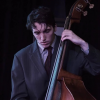



 Buy Now
Buy Now






